No products in the cart.
Knowledge, Morals & Manners
The Etiquette of Seeking Knowledge
Item Code: 252
Availability:
Out of stock
1,250 PKR
Out of stock
CompareAuthor: Shaykh Bakr Aboo Zayd
Translator: Abu Abdillah Murad ibn Hilmi
Publisher: Al Hidaayah Publishing
Pages: 97
Binding: Softcover
ISBN:1-898649-41-3
About the Book: In the past, scholars used to dictate to the seekers of knowledge the etiquette of seeking knowledge, carrying the knowledge, the etiquette of the student with their teacher etc.
CHAPTER 1: The Etiquette of the Seekers Inner Self Knowledge is Worship.
Some scholars say Knowledge is a secret prayer and the worship of the heart. Therefore the conditions of worship are: 1. Al-Ikhlaas (Sincerity) to Allaah the All-Mighty. Allaah said (which means) “And they were commanded not except to worship Allah Alone sincerely.” [Soorah Al-Bayyinah, v:5]
Likewise our beloved Prophet sallallaahu Alayhi wasallam said, “Verily actions are by the intentions” [Bukhari and Muslim].
So avoid Ar-Riyaa and Tasmee (showing off with the intention of being heard). Seek the Pleasure of Allaah and avoid everything that blemishes your intention such as loving to stand out, seeking wealth, glory, fame, praiseworthiness etc. 2. As-Sunnah (In accord with the way of Prophet Muhammad sallallaahu Alayhi wasallam)
Allaah subhaanahu wa ta-alaa said (meaning): “Say, If you truly love Allaah, then follow me (i.e. the Prophet), Allaah will love you and forgive you of your sins. [Soorah Aal-e-Imraan, v:31]
*Be adherent to the path of the Pious Predecessors: Ibn Taymiyyah said, “Ahlus-Sunnah are the finest selection of Muslims and the best people towards people.” “And verily, this is my Straight Path, so follow it, and follow not (other) paths, for they will separate you away from His Path.” [Surah Al-An-aam, v:153]
*Adorn yourself with the splendour of knowledge: by having beautiful manners, pious conduct, peacefulness, humility, humbleness etc. Ibn Seereen said they (i.e. the Salaf) used to learn manners as they would learn knowledge.
*Adorn yourself with honour: and that which leads to it, such as good manners, a cheerful face, spreading the Salaam, showing forbearance etc. Avoid what tarnishes your honour, whether it is your nature, speech, or actions, evil habits, boastfulness, arrogance, looking down at others.
*Outside appearance (dress): is an indication of the person’s affiliation and expressing themselves. So be careful about what you wear. Your clothes indicate to the onlooker as to how to categorize you in terms of dignity, sensibility, or it shows you to be a shaykh, a person of worship, a childish person, or a person who loves to be noticed.
*Adorn yourself with gentleness: Adhere to being gentle in speech, avoiding harsh words, for gentle speech wins over hostile personalities.
*Contemplation: Think before you speak, what am I going to say? What will be the results of what I am going to say? Be careful how you phrase it.
CHAPTER 2: The Methodology of Seeking Knowledge
*Whoever does not perfect the foundation is prevented from reaching their aim in knowledge” and “whoever wants to attain knowledge in one go, will lose it in one go”. Seeking knowledge should be taken step by step. The proof for that is: “And [it is] a Qur’an which We divided into parts in order that you may recite it to men in intervals, and We revealed it by stages.” (Surah Al-Israa :106)
*Memorize the Qur’an (if possible), then attend lessons from: (Aqeedah) Books on Tawheed such as Kitaab Al-Tawheed, Al-Aqeedah Al-Waasitiyyah etc (Hadeeth) The Forty Hadeeth of An-Nawawi, (Fiqh) Buloogh Al-Maraam (Tafseer) Ibn Katheer (Seerah) Zaad Al-Ma’ad etc & other books related to these topics as a foundation.
*Capture knowledge by writing it down. *Acquire knowledge from the Mashaaikh: The basis of knowledge should be taken by way of dictation and acquisition from the teachers, by being in the company of scholars and taking from the mouths of men, and not from the depths of books. Whoever becomes involved in seeking knowledge without a Shaykh will emerge without knowledge, because knowledge is a profession and every profession has its experts, therefore, it is necessary to have a proficient teacher in order to learn. If you wish to attain knowledge without a teacher, you will stray from the straight path.
CHAPTER 3: The Etiquette of the Seeker with their Shaykh
As knowledge is not attained primarily from the books, rather it is necessary to take from a shaykh in order to perfect the keys of knowledge with him. The student should likewise maintain a certain etiquette when with the shaykh. Abstain from arguing in front of him, talking excessively, interrupting him continually, excessive questions etc. Avoid calling him by his first name, rather call him shaykhee, or ya shaykhanaa. Just as you would not refer to your father by his name.
CHAPTER 4: The Etiquette of Companionship
*Beware of bad companions: People are like flocks of birds, naturally disposed to imitating one another, so beware of associating with bad companions for it is indeed destruction and prevention is better than cure. Therefore, choose the best companions and friendship. Someone who will help you in your quest in drawing nearer to your Lord.
CHAPTER 5: The Etiquette of the Student in Leading a life of knowledge
*One must have high aspirations in knowledge: Having high aspirations will attract endless good from Allaah that will never cut off. *Emigrating for the sake of seeking knowledge: Whoever does not emigrate to seek knowledge in search of teachers and travel to acquire from them, then it is unlikely that he will ever be qualified to be traveled to (for people to learn from him), as knowledge will be gained that is rare to find in the depths of books.
*Preserve the knowledge through writing it: Do your best to preserve knowledge in written form as this will safeguard it from being lost. So bind knowledge by writing, especially benefits that are unlikely to be found in corners. Likewise, forgetfulness in frequent.
*Occasional revision of knowledge: Whoever does no revise knowledge will lose it. If the Quran which has been made easy to memorize- is lost without revision, then how about other forms of knowledge?
*The sanctuary of the seeker of knowledge: is to say I do not know (laa adree). If you are unsure of the answer then make sure you say this.
*Avoid procrastination: Preserve your life by tacking your time serious, adhering to study and being in the company with the people of knowledge. Do not be one who says I will get round to it later. Value your time now and act now.
*Completion of learning the tools: The seeker should not leave a subject until they have perfected it.
CHAPTER 6: Adorn Yourself with the Implementation of Knowledge
*The alms of knowledge: Openly proclaim the truth, enjoin the good and forbid the evil, weigh up the advantages and disadvantages. Due to the nobility of knowledge, it increases with implementing it.
*Dealing with the books: After purchasing a book, do not put it in your library until you have a browse, read its forward and index, and a few extracts from it.
CHAPTER 7: Precautions
*False hopes: to claim knowledge in something that you know not, or proficiency in what you are not proficient.
*Beware of being Abu Shibr (father of a span): It is said that knowledge has three spans; whoever enters the first span will become arrogant (he thinks he knows it all), then the who enters the second span will become humble (because he realizes he needs to learn a lot more), then he who enter the third span will realize that he knows nothing.
*Becoming manifest before becoming qualified: It was said, Whosoever manifests themselves before their time, then they have manifested themselves into humiliation. (e.g. if you are not really a shaykh yet, they do not claim to be one).
*Beware of the Byzantine debate: for they use to debate about whether the Angels were male or female while (they were arguing about a not so important issue) their enemy was at the gates of their county, then they were defeated.
*Avoid sectarianism: Hold together to the Rope of Allaah.
(May Allaah bless you to be a successful student.. Ameen).
-Summarized by Abdul-Shaheed Drew
Based on 1 review
Add a review
| Weight | 0.16 kg |
|---|---|
| Dimensions | 15 x 21 x 1 cm |



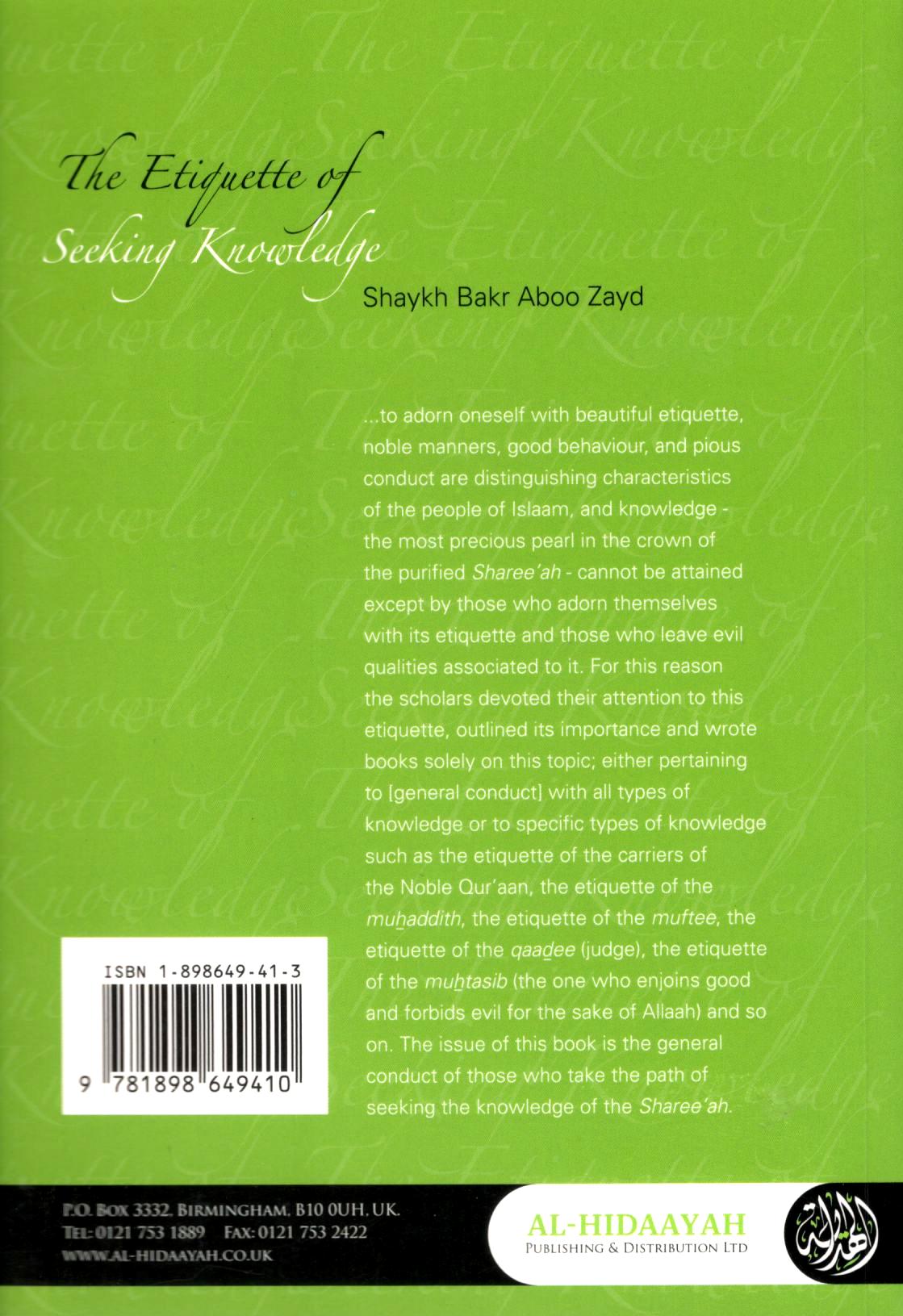
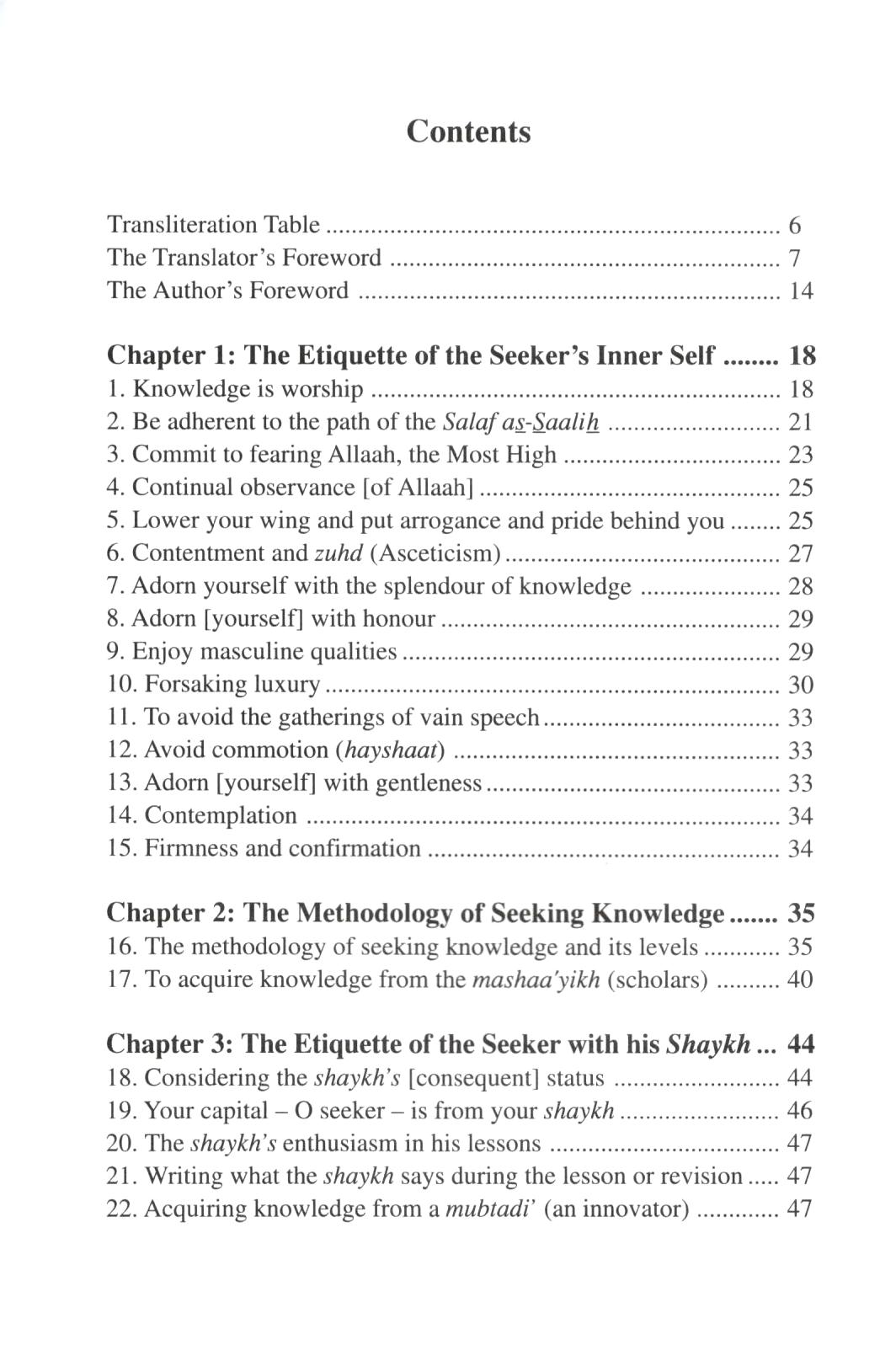
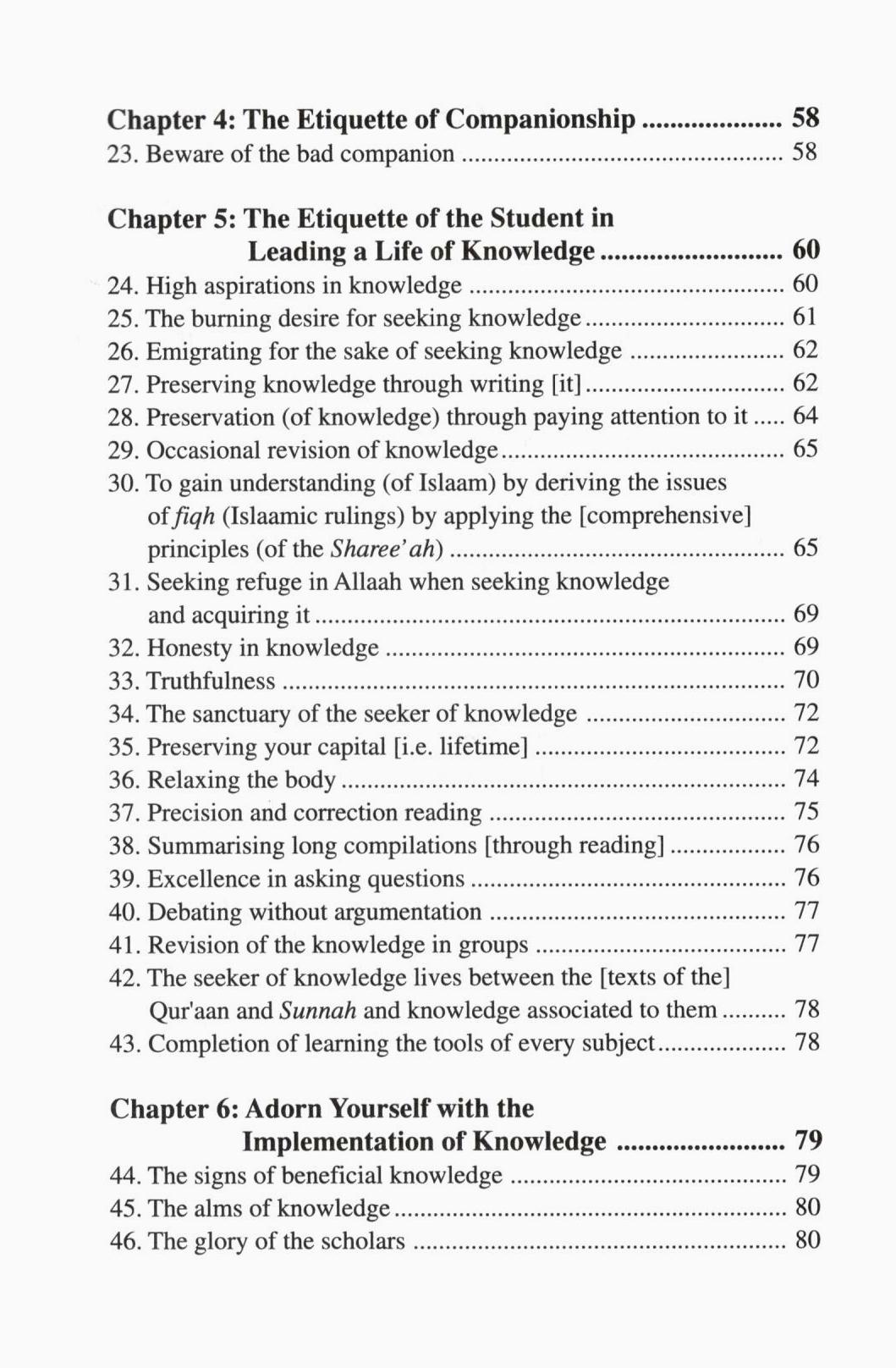
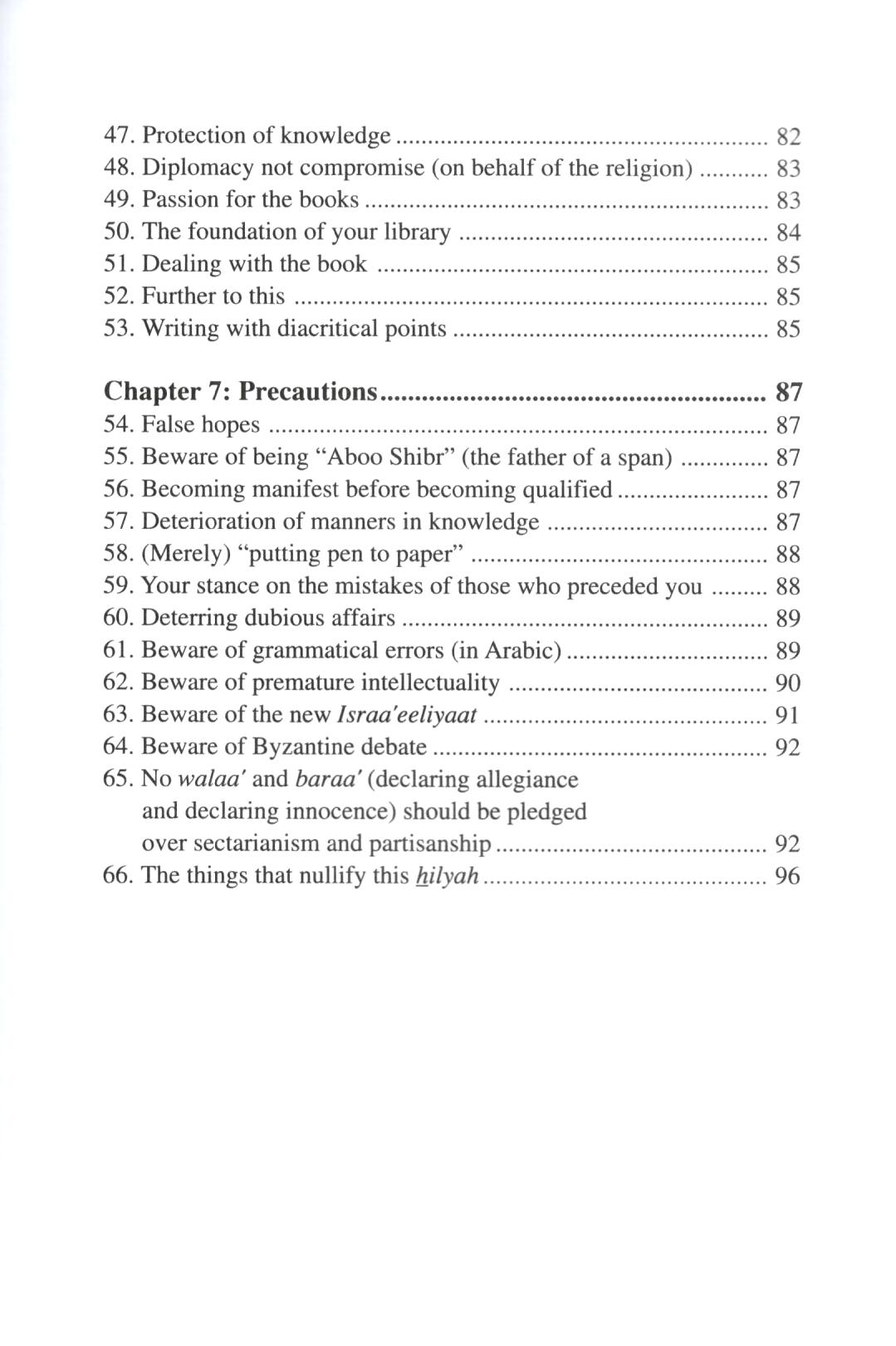
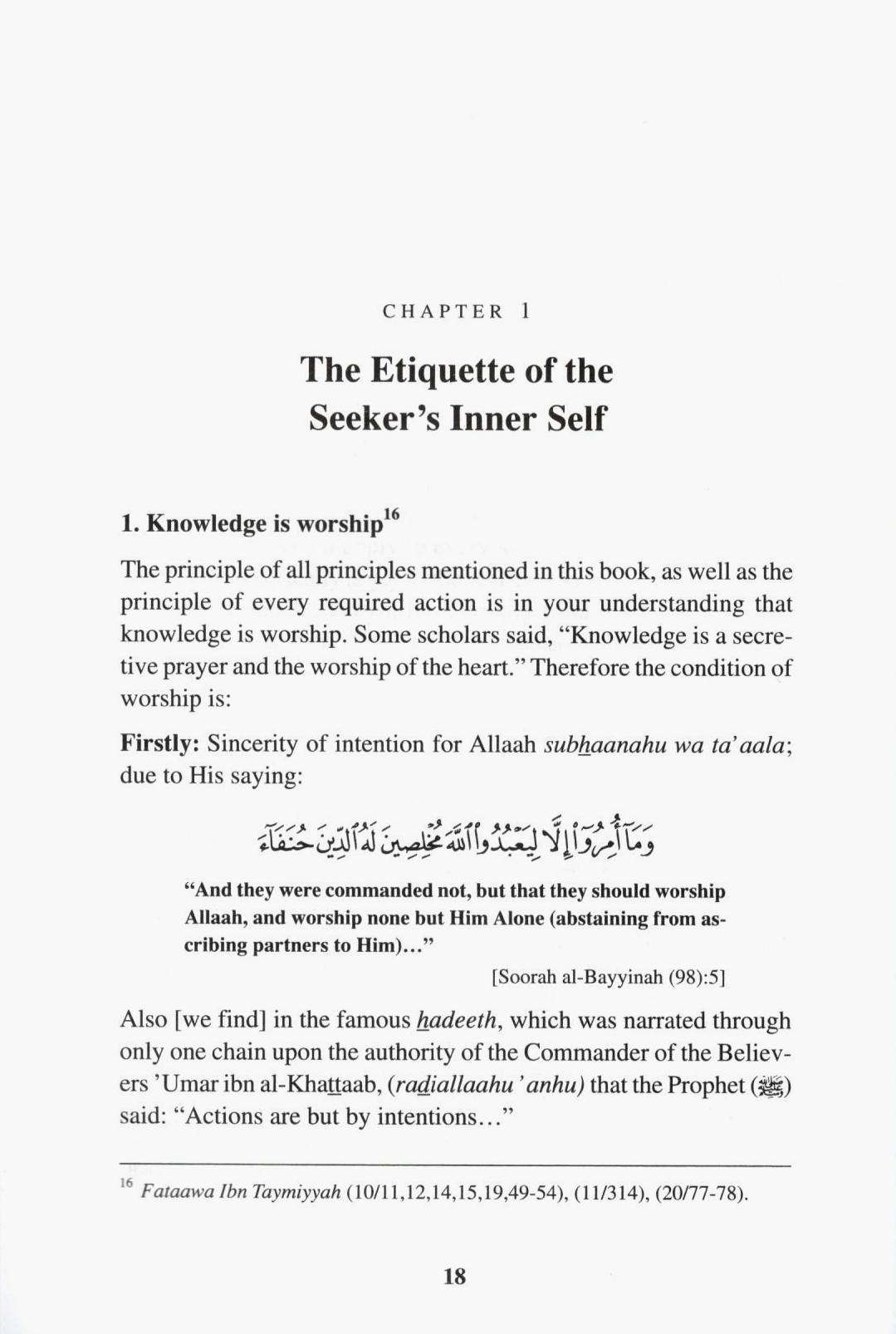
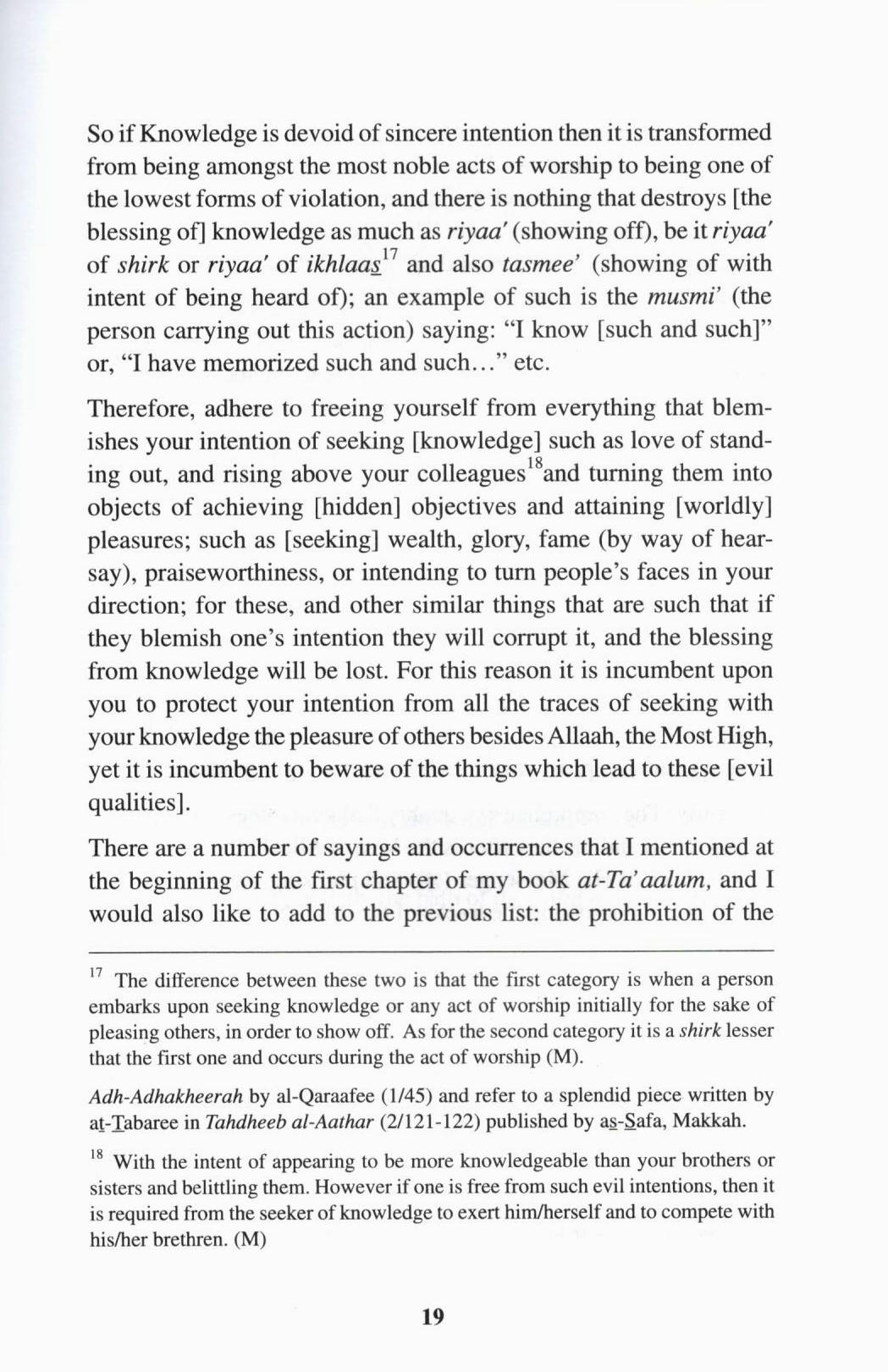

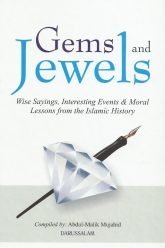

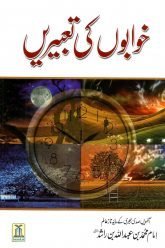
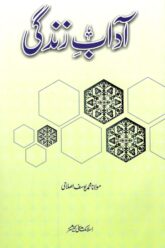
Hina Sami –
I had the honor of studying this book with a teacher, Dr. Bilal Philips at the beginning of our course of study. I have to admit that I judged this book to be an easy read owing to its size but once our study began I was taken aback by the depth. Every student of knowledge must study this book and review it regularly to stay on track!
Hina Sami –